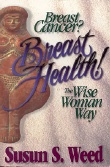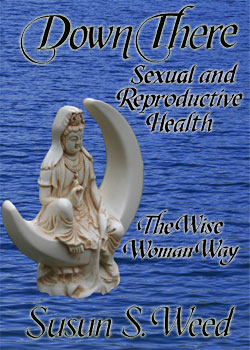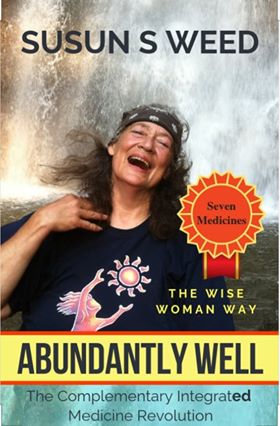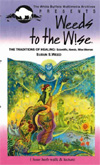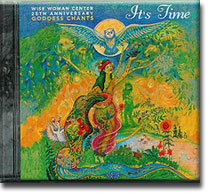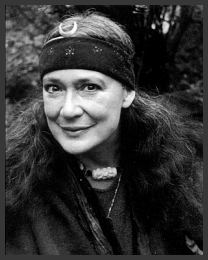PHYTOESTROGENS - FRIENDS OR FOES?
CAN PLANT HORMONES HELP WOMEN IN MENOPAUSE? DO THEY AFFECT BREAST CANCER?
~2002, Susun S. WeedPhytoestrogens are weak hormones found in many plants. They are currently being promoted, sometimes in highly refined forms, for relief of the symptoms of menopause. Are they safe~ Can they promote breast cancer~
We know that increased exposure to hormones - such as those used in the cattle industry, those given to women during menopause, those taken by women engaged in hi-tech pregnancy efforts, and even those naturally produced by our own bodies - increases our risk of being diagnosed with cancer, especially breast cancer. And many believe that hormone-like chemicals - xenoestrogens - increasingly found in our food and water, contribute to cancer as well. Doesn't that imply that phytoestrogens will increase cancer risk too~
Virtually everything we eat - grains, beans, nuts, seeds, seed oils, berries, fruits, vegetables, and roots - contains phytoestrogens. Scientists measuring the amount of phytoestrogen break-down by-products in the urine of healthy women found that those with the least were four times more likely to be diagnosed with breast cancer than with the most. Phytoestrogens actually appear to protect tissues from the cancer-causing effects of xenoestrogens and other hormonal pollutants.
This seems simple - eat more phytoestrogens, be healthier - and it is, so long as we restrict ourselves to eating plants. But when the difference between food and medicine is disregarded, when phytoestrogens are isolated and concentrated, sold to us in pills and candy bars, then the equation changes: phytoestrogens become dangerous hormones, quite capable of promoting cancer.
To get the greatest benefit from phytoestrogenic foods and herbs remember:
1. Isolated phytoestrogens are not as safe as those "in matrix."
2. To make use of plant hormones, you need active, healthy gut flora.
3. Herbs and foods rich in phytoestrogens need to be used in different ways.
4. Phytoestrogens may have different effects on women who do not have their ovaries.
1. Plants contain many types of phytoestrogens; additionally, they contain minerals and other constituents which help our bodies modify the phytoestrogens and so we can use them safely. Red clover, for instance, is mineral-rich and contains all four of the major types of phytoestrogens: lignans, coumestans, isoflavones, and resorcylic acid lactones. It is the world's best-known anti-cancer herb. In general, foods and herbs rich in phytoestrogens, with the possible exception of licorice, show anti-cancer abilities. Isoflavone, however, when isolated (usually from soy) has the opposite effect: in the lab it encourages the growth of breast cancer cells (endnote 32 in New Menopausal Years).
2. Plant hormones, including most phytoestrogens, can't be used by humans. But we can convert them into ones we can use - with the help of our gut bacteria. When women take antibiotics, their excretion of phytoestrogens plummets. Get your gut flora going by eating more yogurt, miso, unpasteurized sauerkraut, homemade beers and wines, picked-by-your-own-hands-and-unwashed fruits and salads, sourdough bread, and whey-fermented vegetables (see Nourishing Traditions by Sally Fallon for whey-fermented vegetable recipes).
3. Plants which are exceptionally rich in phytoestrogens are regarded as powerful herbal medicines. Plants which are good sources of phytoestrogens are regarded as foods. While food can certainly be our medicine - a practice I advocate - it is also true that medicines are more dangerous than foods. Foods rich in phytoestrogens are different than medicinal herbs rich in phytoestrogens. They have different places in my life.
~ I eat phytoestrogenic foods daily in quantity.
~ I use phytoestrogenic food-like herbs regularly but not daily and in moderate quantity.
~ I take phytoestrogenic herbs rarely, usually in small amounts and for a limited time.Phytoestrogenic foods are the basis for a healthy diet and a long life. The first food listed is the highest in phytoestrogens. The best diet contains not just one but many choices from each list:
~ Whole grains (rye, oats, barley, millet, rice, wheat, corn)
~ Edible seeds (buckwheat, sesame, sunflower, pumpkin, amaranth, quinoa)
~ Beans (yellow split peas, black turtle beans, baby limas, Anasazi beans, red kidney beans, red lentils, soy beans)
~ Leafy greens and seaweed (parsley, nettle, kelp, cabbage, broccoli, kale, collards, lamb's quarter)
~ Fruits (olives, cherries, grapes, apples, pears, peaches, plums, strawberries, blackberries, raspberries, salmon berries, apricots, crab apples, quinces, rosehips, blueberries)
~ Olive oil and seed oils
~ Garlic, onions and their relatives leeks, chives, scallions, ramps, shallotThe exceptions to the rule that plants don't contain human hormones:
~ French beans, rice, apple seeds, licorice, and pomegranate seeds contain the “weak” estrogen estrone.
Phytoestrogenic food-like herbs are generally considered longevity tonics. For optimum effect, use only one from the list below and to stick with it for at least three months:
~ Citrus peel, dandelion leaves and/or roots, fenugreek seeds, flax seeds, green tea, hops, red clover, red wine.
Phytoestrogenic herbs are usually too powerful for long-term use. From the list below (which is in alphabetical order), it is safest to use only one herb at a time, and use it only when needed, although that may mean daily use for several months. More information about these herbs, including specific dosages and cautions, is in New Menopausal Years the Wise Woman Way.
~ Agave root, black cohosh root, black currant, black haw, chasteberries, cramp bark, dong quai root, devil's club root, false unicorn root, ginseng root, groundsel herb, licorice, liferoot herb, motherwort herb, peony root, raspberry leaves, rose family plants (most parts), sage leaves, sarsaparilla root, saw palmetto berries, wild yam root, yarrow blossoms.
4. Most of the warnings about phytoestrogenic herbs center on their proven ability to thicken the uterine wall in animals who have had their ovaries removed. This could encourage cancer, just as taking ERT encourages cancer of the uterus by stimulating cell growth. Women without ovaries are probably safe eating phytoestrogenic foods, but may want to use phytoestrogenic herbs - especially ginseng, dong quai, licorice, red clover, and wild yam - in small amounts and only for short periods.
Phytoestrogens can be our friends. In a world that seems increasingly hostile and threatening, green allies offer us ways to stay safe and healthy, so long as we use them with wisdom and honor.
This article is based on information in New Menopausal Years the Wise Woman Way, read more at www.menopause-metamorphosis, Susun Weed's hot new site for Menopausal Women online!
For permission to reprint this article, contact us at:
www.ashtreepublishing.com/contactVisit Susun Weed at: www.susunweed.com and www.wisewomanbookshop.com
Susun Weed’s books include:
Wise Woman Herbal for the Childbearing Year
Author: Susun S. Weed.
Simple, safe remedies for pregnancy, childbirth, lactation, and newborns. Includes herbs for fertility and birth control. Foreword by Jeannine Parvati Baker. 196 pages, index, illustrations.
Order at: www.wisewomanbookshop.com
Healing Wise
Author: Susun S. Weed.
Superb herbal in the feminine-intuitive mode. Complete instructions for using common plants for food, beauty, medicine, and longevity. Introduction by Jean Houston. 312 pages, index, illustrations.
Order at: www.wisewomanbookshop.com

NEW Menopausal Years the Wise Woman Way
Author: Susun S. Weed.
The best book on menopause is now better. Completely revised with 100 new pages. All the remedies women know and trust plus hundreds of new ones. New sections on thyroid health, fibromyalgia, hairy problems, male menopause, and herbs for women taking hormones. Recommended by Susan Love MD and Christiane Northrup MD. Introduction by Juliette de Bairacli Levy. 304 pages, index, illustrations.
Order at: www.wisewomanbookshop.com
For excerpts visit: www.menopause-metamorphosis.com
Breast Cancer? Breast Health!
Author: Susun S. Weed.
Foods, exercises, and attitudes to keep your breasts healthy. Supportive complimentary medicines to ease side-effects of surgery, radiation, chemotherapy, or tamoxifen. Foreword by Christiane Northrup, M.D. 380 pages, index, illustrations.
Order at: www.wisewomanbookshop.com
Down There: Sexual and Reproductive Health the Wise Woman Way
Publication date: June 21, 2011
Author: Susun S. Weed
Simple, successful, strategies cover the entire range of options -- from mainstream to radical -- to help you choose the best, and the safest, ways to optimize sexual and reproductive health. Foreword: Aviva Romm, MD, midwife, 484 pages, Index, illustrations.
Order at: www.wisewomanbookshop.com
Abundantly Well - Seven Medicines The Complementary Integrated Medical Revolution
Publication date: December 2019
Author: Susun S. Weed
Seven Medicines build foundational health and guide you to the best health care when problems arise. Includes case studies, recipes, exentsive references and resources. Introduction by Patch Adams illustrated by Durga Yael Bernhard 352 pages, index, illustrations
Order at: www.wisewomanbookshop.com
Susun Weed's Video & CD's:Weeds to the Wise DVD Video
Visit Susun's farm for a weed walk. Hear her talk on the Three Traditions of Healing. Make infusion with her. Fun! (1 hour VHS video) Please note: this VHS video tape is in NTSC format which may not be compatible with video players outside of the USA and Canada.
Order at: www.wisewomanbookshop.com
Susun Weed's "It's Time"
Wise Woman Center
25th Anniversary Celebration CD
GODDESS CHANTS CD
Visit www.goddesschants.com to hear all the songs, read lyrics &
learn about the artists.
18 Wise Woman Songs & Chants from the heart
For Wholesale orders see our terms letter or contact us at:
Ash Tree Publishing PO Box 64 Woodstock, NY 12498 ~
Website: www.wisewomanbookshop.com ~ E-mail: susunweed@herbshealing.com
Susun Weed, green witch and wise woman, is an extraordinary teacher with a joyous spirit, a powerful presence, and an encyclopedic knowledge of herbs and health. She is the voice of the Wise Woman Way, where common weeds, simple ceremony, and compassionate listening support and nourish health/wholeness/holiness. She has opened hearts to the magic and medicine of the green nations for decades. Ms. Weed's Six herbal medicine books focus on women's health topics including: menopause, childbearing, and breast health. Visit her site www.susunweed.com for information on her workshops, apprenticeships, correspondence courses and more! Venture into the Menopause site www.menopause-metamorphosis.com to learn all about the Menopausal Years the Wise Woman Way.
Join Susuns Mentorship site for personal one on one mentorship! We also invite you to visit our commerce site www.wisewomanbookshop.com to learn about our Wise Woman publications, workshops, correspondence courses. As well as online courses at Wise Woman School.
back to articles index
back to press kit© Susun Weed -Wise Woman Center
~ Disclaimer & Privacy Policy ~


